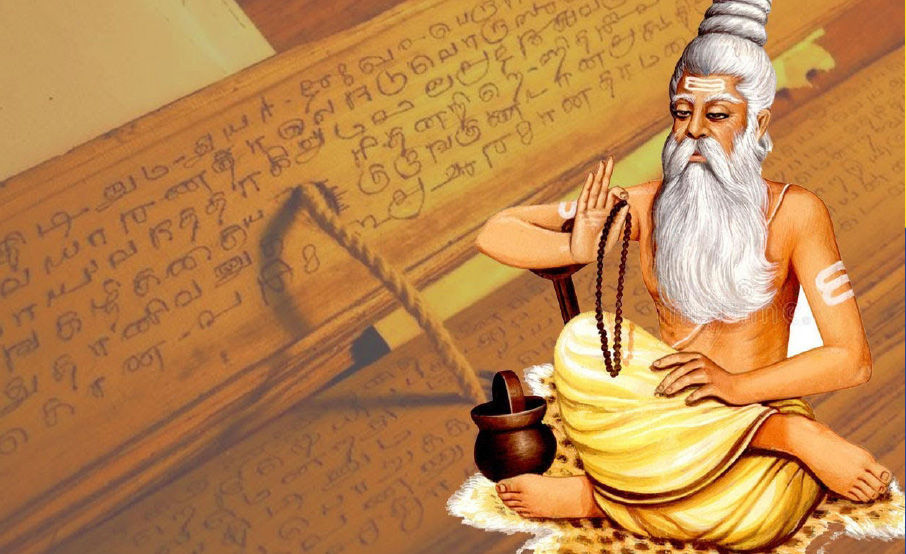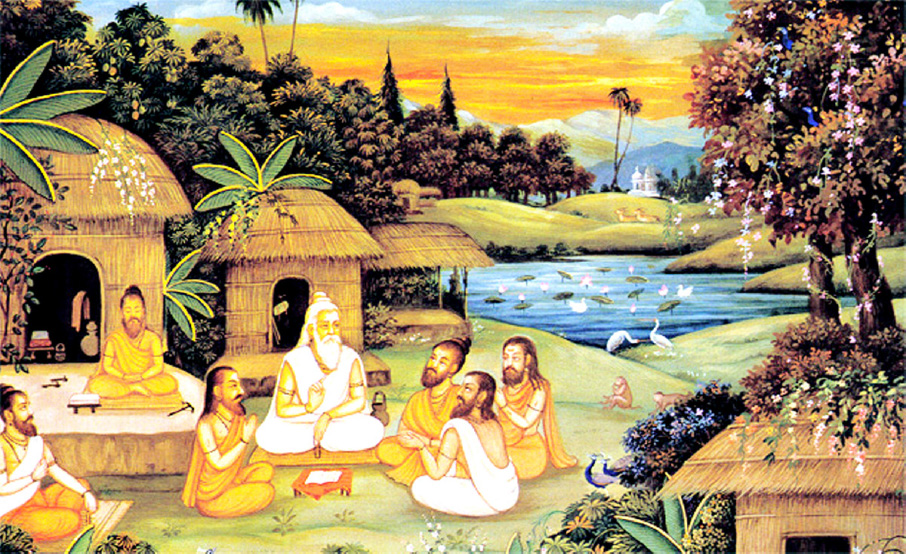When it comes to the sensitive topic of Varnashrama, or what many people call the caste system of India, we have seen so many talks over this issue, both pro and con, back and forth, this way and that. We all know that the Vedic system of Varnashrama has been mentioned in the Vedic literature in many places, such as in the Purusha Sukta verses of the Rig-veda (Book Ten, Hymn 90). But there is no indication in these verses that say that birth is the essential quality for one’s varna. Yet, it seems that many people still don’t understand how the varna system was meant to be implemented, as can be seen in the modern form of the caste system of today. The problem is not because of Varnashrama, but because of this misunderstanding of what it really is that has caused so many of India’s social problems. This article contains many quotes from Vedic shastra to clarify what the Varnashrama or caste system is actually supposed to be.
This article is for those more familiar with the topic, but for those who are not we can explain briefly that there are four basic social divisions, namely the Brahmanas (those who are priests, or interested in the study, teaching and practice of spiritual knowledge and intellectual pursuits), Kshatriyas (those who are soldiers, in the military, or police, politicians, managers, etc.), Vaishyas (merchants, businessmen, bankers, farmers, tradesmen, etc.), and Shudras (those who have little interest in the study of the Vedic literature or spiritual pursuits, and would rather engage in simple labor or employment, or technicians and other craftsmen in the service of others, etc.). Outcastes are those who are outside these four. There are also the four ashramas of life, which include Brahmacharis (student life, generally celibates), Grihastas (householders), Vanaprasthas (those who are retired from family life), and Sannyasa (the renounced monks, some of whom travel the world to teach). This is the Vedic system of Varnashrama.
 The modern caste system is seen to usually dictate one’s varna or caste merely by one’s birth family, as if one automatically inherits the caste of one’s father, which is why there is a growing dislike for it. This is not the traditional Vedic system of Varnashrama. This is the difference and the problem. The traditional Vedic system calculated one’s occupational class by recognizing one’s natural talents, interests, tendencies, and abilities. It was similar to the modern system of having high school counselors adjust a student’s academic courses by discussing with the students their interests in conjunction with the results of their IQ tests. Thus, such counselors see what occupational direction is best suited for the students so they can achieve a fitting career that is of interest to them and helps them be a contributor to society at the same time. And the four basic divisions of society, as outlined in the Vedic system, are natural classifications and found everywhere, in every society, call it what you want. Plus, the traditional Vedic Varnashrama system was never so inflexible that one could not change from one occupation or class to another. The rigidity of the present-day caste system, based on jati or one’s birth family, is actually leading us away from the flexibility, and the common sense, of the Vedic varna system.
The modern caste system is seen to usually dictate one’s varna or caste merely by one’s birth family, as if one automatically inherits the caste of one’s father, which is why there is a growing dislike for it. This is not the traditional Vedic system of Varnashrama. This is the difference and the problem. The traditional Vedic system calculated one’s occupational class by recognizing one’s natural talents, interests, tendencies, and abilities. It was similar to the modern system of having high school counselors adjust a student’s academic courses by discussing with the students their interests in conjunction with the results of their IQ tests. Thus, such counselors see what occupational direction is best suited for the students so they can achieve a fitting career that is of interest to them and helps them be a contributor to society at the same time. And the four basic divisions of society, as outlined in the Vedic system, are natural classifications and found everywhere, in every society, call it what you want. Plus, the traditional Vedic Varnashrama system was never so inflexible that one could not change from one occupation or class to another. The rigidity of the present-day caste system, based on jati or one’s birth family, is actually leading us away from the flexibility, and the common sense, of the Vedic varna system.
For this reason, you could say that the modern caste system that we find today is opposed to the Vedic system of varna. The Vedic process was a matter of bringing experience and wisdom of the ages to assist and direct a person’s life in what would be the most productive and satisfying occupation that would fit the mentality, interests, talents, and level of consciousness of an individual. It was never meant to dominate, stifle, hold down, or demean anyone. Therefore, the modern caste system as we find it today should be thrown out, and the natural system of the Vedic Varnashrama should be properly understood as it was meant to be.
Another problem with the present day caste system is that an increasing number of adults in India, what to speak of Western countries, who come from different varnas, different family lineages, various ethnic backgrounds, are getting married and becoming parents. How is it possible then to determine the caste or varna of the child they produce based merely or only on its birth or parentage? So when this increases to additional mixed varnas and jatis, caste by birth no longer holds true, if it ever could. It increasingly depends on guna and karma, which molds the tendencies, talents, abilities, intelligence level, attractions, and characteristics of the individual. And this cannot be determined until the child engages in actions and interactions among others. Only then is there some indication for what is a person’s varna or most likely career classification.
So, to show what I’m talking about, here in the shastric quotes that follow I try to provide a clear description of how the varna system was never meant to be based merely on one’s family birth, but by one’s talents, natural interests, proclivities, expertise, and activities. These quotes are from the Bhrama Parva section of the Bhavishya Purana (abbreviated as BP), and no matter how much or how little credit you give to this Purana, you still cannot deny the logic with which this information is presented. The verses cited herein from the Bhrama Parva section of the Bhavishya Purana is known to be relatively free of corruptions and its antiquity is vouchsafed as well. The same verses are also repeated verbatim in the Skanda Purana (north Indian versions) and a few verses of similar purport are also found in the beginning of the Shukranatisara. Some scholars say that the last is a 19th century forgery, but no less than Swami Dayanand Sarasvati acknowledged it as an ancient text, and most scholars date it between 300-1200 AD. So at a minimum, these verses do represent an alternative opinion and an elaboration on the Vedic varna-jaati system.
There are many other points about the caste system that could be discussed, such as untouchability, etc., but please note, this article is not taking those up, but merely following the outline as brought up in the following shastric quotes focusing on the Bhavishya Purana. In this portion of the Bhavishya Purana that follows, the answers to the questions are spoken by Sumantu, the disciple of Srila Vyasadeva, to King Shatanika. This was at the suggestion of Srila Vyasadeva [VedaVyasa] who was sitting nearby in the assembly of sages, all of whom were listening to the discussion. (Bhavishya Purana, Bhrama Parva, Chapter 1.28-35)
HOW DO WE RECOGNIZE ONE’S VARNA?
First of all, how do we recognize one’s varna is an ancient question, even asked by the sages of the distant past to Lord Brahma. What is it that really makes the difference between one person and the next? “The sages asked: O Lord Brahma, in the beginning of creation, how was one recognized as a Brahmana? Was it because of his birth in a particular family, his knowledge of the Vedas, the characteristics of his body, his accomplishment of self-realization, his quality of behavior, or the prescribed duties he carried out? Is it the mind, speech, activities, body, or the qualities that determine one’s social status? Surely one’s birth in a certain caste [or family] is not sufficient for one to be recognized as a Brahmana. One’s qualities and work must also play an important part in determining a person’s position in society. The Vedic literature supports this view.” (BP, 38.8-11)
“Different social orders, such as the Brahmanas and Kshatriyas (and others) are directly seen, but simply being born in a particular family does not automatically grant one his social status. An intelligent person can easily recognize a horse in the midst of many cows. Similarly, among many who are born in a particular social status, those who are actually qualified in terms of character and activities can be easily recognized. (BP, 38.19-20)
“Some people say that all of humanity is the topmost caste, and there is nothing more to be said than this. They fail to understand that the various purificatory processes, such as the sacred thread ceremony [initiation into the twice-born status], make a person distinct from those who do not undergo such rituals.” (BP, 38.21)
Such customs certainly help one progress and is recommended, but the fact remains that in spite of such purificatory rites, we are all still very much the same, as described next.
WE ARE ALL QUITE ALIKE
“How can all the living entities who take birth, grow old, become diseased, and then die, who suffer the threefold miseries of material existence, who take birth in innumerable species, such as human beings, birds, dogs, pigs, dog-eaters, insects, and tortoises, who are all placed into very awkward conditions of life, fraught with danger, illness, lamentation, and distress, and who are constantly being drowned by the burden of their grave sinful reactions, be accepted as qualified Brahmanas?” (BP, 38.23-25)
Therefore, there must be some additional means that can help identify one’s mental makeup and high or low level of intellect and consciousness.
IT IS ONLY OUR ACTIONS AND QUALIFICATIONS THAT DIFFERENTIATE US
“Just as one can differentiate between a soldier, an elephant, a horse, a cow, a goat, a camel, and an ass by seeing their colors and forms [as distinguished because of their birth], all living entities have different characteristics and duties that distinguish them from one another.” (BP, 38.30)
“[However] the question, ‘Who is a Brahmana?’ cannot be answered so easily. Actually, there is no question of a person being qualified as a Brahmana simply because he was born in a family of Brahmanas. When a person is designated as belonging to one of the four divisions of the social order [whether it be Kshatriyas, Vaishyas, Shudras or Brahmanas]—that [designation] is not eternal. There is no physical characteristic that enables one to determine who is a Brahmana. A fair or dark complexion, which, after all, is temporary, is no real indication of a person’s varna.” (BP, 38.31)
In Goswami Tulsidas’s Shri Ramcharitmanas there are many instances when this issue is also addressed. In the ‘Sabri episode’, Lord Rama speaks to Sabri about the importance of action (Chapter III, Aranya Kand, Verse 34, Line 4,5,6). It is clearly stated that “Bhakti (devotion and unification with the supreme), does not consider caste, religion, etc., rather it is determined by the character and qualities of an individual.”
A CASTE SYSTEM BASED ON BIRTH IS UNJUST
“Therefore, the conception of a caste system based solely on birth is artificial and temporary. It may seem to be reality, but that is only due to the influence of the practice of a particular period. A businessman and doctor are both human beings, but their profession is different. Their work is according to their nature and qualities, and not because of the family they were born into.” (BP, 38.32)
“Can a person, thus, claim to be a Brahmana if he does not act according to the codes of good conduct? Can a man claim to be a Kshatriya if he does not protect the citizens? Can a person claim to be a Vaishya if he gives up performing his prescribed duties [in business, trade or farming]? Can a person claim to be a Shudra if he abandons service to the higher three classes?
“There is no physical difference between human beings as there is between cows and horses. Actually, all living beings should be treated with respect, knowing that they are one in quality as spirit souls, although they may temporarily have different varieties of forms and activities.” (BP, 38.33-34)
“Therefore, the caste system in human society that is based solely upon birth should be understood as superficial, because it is not prescribed in the scriptures. Unfortunately, those in ignorance cannot understand that it is a man-made concoction that can be easily refuted by a person in knowledge.” (BP, 38.35)
“If a person considers himself to be a Brahmana by birth but engages in [such things as] taking care of cows, buffalos, goats, horses, camels, or sheep, or acts as a messenger, tax collector, businessman, painter [artist], or dancer, he should be considered as not a real Brahmana, even though he may be very expert or powerful.” (BP, 38.36-37)
“Brahmanas who have deviated from the path of righteousness as propagated by the scriptures are to be considered fallen [from their social status], even though they may belong to a very aristocratic family, and have performed all the required purificatory rituals, and carefully studied the Vedas. No amount of accomplishments gives one the right to justify sinful behavior.” (BP, 38.42-43)
“Thus, it can be understood how a Brahmana can become a Shudra, a Shudra can become a Brahmana, a Kshatriya can become a Brahmana or a Vaishya, and so on.” (BP, 38.47)
Herein we can understand that a Brahmana is no Brahmana if he is not endowed with purity and good character, or if he leads a life of frivolity and immorality. However, a Shudra is a Brahmana if he leads a virtuous and pious life. Varna or caste is a question of character. Varna is not the color of the skin, but the color of one’s character and quality. Conduct and character is what matters and not lineage alone. If one is Brahmana by birth and, at the same time, if he possesses the virtues of a Brahmana, that it is extremely good, because it is only certain virtuous qualifications that determine if one is a Brahmana, just as certain qualities distinguish one as a Kshatriya, Vaishya or Shudra. But if a Brahmana does not have the necessary traits, then he cannot call himself a Brahmana.
“Brahma said: If study of the Vedas is an important criteria for being recognized as a Brahmana, then many Kshatriyas and Vaisyas also deserve to be called Brahmanas, just as Ravana became known as a demon [by qualities and actions]. Similarly, there are many dog-eaters, laborers, hunters, fishermen, sailors, and other people [outside the higher classes] who study the Vedas. Therefore, mere study of the Vedas cannot be the criteria for determining a person’s social position.”
(BP, 39.1-2, 6)
The point is that “One who is twice-born and has thoroughly studied the Vedas, along with its six branches, cannot claim to be a purified soul if he does not observe the codes of good conduct. It is the occupational duty of one who is twice-born to study the Vedas, and this is one of the symptoms of a genuine Brahmana. If a person does not perform his prescribed duties after studying the four Vedas, he is like a eunuch who cannot take advantage of having a wife.”
(BP, 39.8-9)
Here again we see that the proper classification of an individual is not the status of one’s birth family, but the qualities that he shows in life. Otherwise, even someone who considers himself to be a sophisticated Brahmana may indeed be something far less. As it is further explained: “Just like a Brahmana, a Shudra can have a shikha, chant Om, worship the deities every morning and evening, wear a sacred [Brhamana’s] thread, carry a staff, and wear a deerskin [like a forest sage]. Even Brahma, Vishnu and Shiva are incapable of preventing people from becoming Shudras, and so what to speak of human beings. Therefore, wearing a sacred thread, keeping a shikha, and dressing a particular way are not really indications of a person’s position within the Varnashrama society. Who can stop a person’s Shudra mentality, even though he may be well-versed in the Vedic mantras and tantras, and is a very good speaker on these subjects?” (BP, 39.10-13)
“[Generally it can be recognized that] All classes of men are seen to be capable of performing austerities, speaking the truth, worshiping the demigods, and chanting mantras. All classes of men generally avoid and [in some cases] even deceive those who speak harshly. Considering this, it is not possible to actually differentiate between a Brahmana and a Shudra. The power to curse and the exhibition of compassion can also be found in Shudras. One cannot ascertain from a person’s external appearance whether he is a thief, a cheater, or a prince. Just as a Shudra is incapable of relieving himself of his miseries and protecting his family, it is the same for a Brahmana.” (BP, 39.14-17)
THE DAMAGE OF UNQUALIFIED BRAHMANAS
“It is better if there are no Brahmanas at all than to have sinful and unqualified Brahmanas in the kingdom [who thus mislead society by what they say and do], especially in Kali-yuga, because in previous ages such Brahmanas would have been censored.” (BP, 39.18)
Furthermore, it is especially difficult in these days to find anyone who is eligible to be considered a member of the higher classes or varnas of society, for it seems that everyone is materially motivated.
“According to some opinion, the power to curse others, a compassionate nature, and an inclination toward spiritual life are the characteristics of a Brahmana. In spite of that, it is seen that practically everyone is attached to worldly activities, having fallen into the darkness of ignorance, and because of that they are helplessly rushing towards hell, just like flies rush towards a fire.” (BP, 39.19-20)
SO WHO IS A REAL BRAHMANA?
We have now seen by the logic presented in the Bhavishya Purana how the jati or birth of an individual does not justify anyone’s social classification. But also how many of those who take pride in considering themselves of a higher caste or varna are actually not qualified in such a way at all. And yet, even a low-class person, meaning having taken birth from a lower social class, can indeed rise up to be a Brahmama. It all depends on one’s level of consciousness, which generally depends on one’s training and then mental disposition towards a spiritual life, and his natural inclination to follow a code of good conduct.
“Only those who have been PROPERLY trained and who have studied the Vedas [are seen to generally] adhere to a life of piety, whereas those without training [in at least general moral standards], who have not studied the Vedas [nor their spiritual conclusion] engage in sinful activities. Because study of the Vedas is the primary duty of a Brahmana [or one who is seriously on the path to spiritual progress, thus showing Brahminical qualities], one who does not study the Vedas cannot be considered a genuine Brahmana.” (BP, 39.25-26)
This is interesting because how many times have we met people who feel they have duly studied the Vedic conclusions but have yet to know how to apply them, nor have they continued to follow them, giving any number of excuses for their present activities. The above verses make it clear that one has to continue to follow the standards, and if he cannot, then he is no longer to be accepted as a person of a higher social class. And this can go for anyone and anywhere. If they have little respect for others, engage in materialistic pursuits without higher moral standards, then that person is someone with a low consciousness, or low varna.
A BRAHMANA CAN EASILY FALL DOWN, WHILE A SHUDRA CAN EASILY RISE UP
“A Brahmana can easily be diverted from his brahminical qualities and codes of good conduct if he becomes bewildered by desires for material enjoyment and blinded by pride, just like an ordinary materialistic person. Of course, anyone becomes degraded and goes to hell if he has a sinful nature, even after undergoing the samskaras. On the other hand, those who observe proper etiquette, even though they might not have undergone the samskaras, should be considered as Brahmanas.
“It is a fact that even someone who chants various mantras and has undergone all the purificatory rituals may fall down into illusion and thereby become bereft of brahminical qualifications due to his sinful mentality. People who engage in abominable activities, and who are blinded by pride in their ability, fall down from their position and lose all brahminical qualities.” (BP, 40.15-18)
Here again I am reminded of what I have always said, that the present caste system based on one’s jati or birth is unjust. It is meant to depend on the person’s natural talents, abilities, tendencies, and mentality, which varies from person to person regardless of family, social class, culture, regional jurisdiction, etc. Each person has to be considered individually regardless of family background.
“The caste system based simply on birth does not actually divide people according to their development of consciousness. It is one’s envy and hatred that allows us to place a person in a higher or lower category. If it is not helpful to divide people according to their bodily characteristics, [then why do so]? In the past, many great sages, such as Srila Vyasadeva, observed proper etiquette and became great souls, although they did not undergo the samskaras, such as the garbhadhana.” (BP, 40.19-20)
For example, “Vyasadeva was the son of a fisherman’s daughter, his father Parashara was born from a woman who was a dog-eater. Shukadeva was born from a female parrot, Vashishtha was the son of a prostitute” and other sages like Kanada, Shringi, Mandapala, and Mandavya all had questionable births, and yet all were highly qualified Brahmanas, and recognized as such.
“Indeed, it is imperative that one strictly follow the instructions of these highly qualified sages, who all possess a spotless character, if one hopes to achieve success in life.
“O King, undergoing the various samskaras certainly plays an important part in raising one to the platform of a qualified Brahmana, but there are many other important considerations. For example, the great sage Shringi achieved the status of a Brahmana on the strength of his austerities. It must be concluded that undergoing samskaras is a principal criteria for becoming a Brahmana. Still, on the strength of their penance and austerity, Vyasadeva, Parashara, Kanada, Vashishtha, and Mandapala became qualified Brahmanas, despite their taking birth from the womb of a fisherwomen, female dog-eater, or prostitute, etc.
“[Therefore] undergoing the various samskaras is not sufficient to qualify one as a Brahmana. Those who are expert in performing the Vedic and tantrik samskaras require the attainment of transcendental knowledge and the performance of penance to support their claim of being qualified Brahmanas. Without such qualifications, one will certainly indulge in sinful activities and thus fall from his high position as a Brahmana. One who is a Brahmana in name only is not really a Brahmana.” (BP, 40.22-32)
Here in these quotations we can see that many great Rishis were born in lower varnas, such as Vashishta was the son of a prostitute; Vyasa was born of a fisher woman; Parashara’s mother was a chandala; Nammalwar was a Shudra. Similarly, Valmiki, Viswamitra, Agastya were Brahmanas in spite of their non-Brahmana origin. In more recent times, for example, Swami Vivekananda, one of the most revered Hindus worldwide, was a non-Brahmana. Or was he? In spite of a non-Brahmana birth he displayed so many high qualities. All this proves that birth is not a major player in attaining the status of Brahmana. It is the intellectual and spiritual level of consciousness that differentiates people.
In the same way, spiritual realization is not dependent on birth or book-learning, as has been repeatedly demonstrated in the lives of saints, from the very earliest times to our own day. So, then who is a real rishi? It is the person who has attained through proper means the direct realization of Dharma. That is the one who can be a rishi even if he is a non-Brahmana or mleccha by birth.
The basis of varna is guna or the mode of nature in which a person is situated, and not birth. Therefore, one is a Brahmana not because of one’s birth or caste or heredity or color or profession or acquisition of worldly knowledge, or mere observation of social and moral codes, but because of his spiritual knowledge and insight, and his abidance in the Supreme Reality, his state of self-realization. This is the conclusion of all Vedas, Shrutis, Puranas, Itihasas, and of all great men of India.
Therefore, casteism, meaning judging a person by one’s birth family, is a misguided social custom and not part of any spiritual tradition, and all our great preachers have tried to break it down. From Buddhism downwards, every sect has preached against caste.

WHEN A BRAHMANA BECOMES LOWER THAN A SHUDRA
“According to Svayambhuva Manu, the principal characteristic of a Brahmana is that he possesses spiritual knowledge, is enriched with the power of penance, and maintains a state of purity. According to this understanding, anyone, whether he belongs to an upper, middle, or lower caste, if he never indulges in sinful activities, he must be considered a Brahmana. It is said that an honest and well-behaved Shudra is better than an arrogant Brahmana, and a Brahmana who disregards the prescribed codes of good conduct is inferior to a Shudra. A Shudra that does not keep wine in his shop or in his house is called an honest Shudra.” (BP, 42.29-32)
This article and more information at
www.stephen-knapp.com


![[ India Today ] Ohio senator JD Vance thanks wife, a Hindu, for helping him find Christian faith](https://hinduvishwa.org/wp-content/uploads/2024/06/us-senator-jd-vance-reveals-how-his-hindu-wife-usha-helped-him-find-his-christian-faith-image-re-272530504-16x9_0-120x86.webp)










